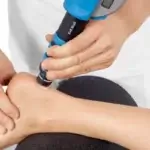Introduction
Extracorporeal Shockwave Therapy (ESWT), or shockwave therapy, is a non-invasive medical treatment that has gained popularity due to its effectiveness in addressing various musculoskeletal conditions. This blog will explore the top conditions treated with shockwave therapy and what you need to know about this innovative treatment option.
Table of Contents
How Shockwave Therapy Works
Shockwave therapy is a non-invasive treatment that uses high-energy pressure waves to speed up the body’s natural healing process. Pressure waves are made by an extracorporeal shockwave generator, which is then used to target the affected area of the patient’s body.
Top Conditions Treated with Shockwave Therapy
Shockwave therapy is used to treat the following conditions:
1) Orthopedic Health Problems
Shockwave therapy is effective in treating several orthopedic problems, such as:
- Plantar fasciitis: When the tissue that connects the heel bone to the toes gets inflamed, this is a common cause of heel pain. Shockwave therapy can ease pain and help the body heal.
- Tendinopathies: Shockwave therapy is an excellent way to treat tendon injuries and inflammation, like Achilles tendinopathy and tennis elbow, because it speeds up tissue repair and reduces inflammation.
- Calcific tendinitis: Shockwave therapy can help break up calcium deposits in the tendons, relieving pain and increasing the range of motion.
2) Sports Injuries
Athletes and other active people can use shockwave therapy to treat several sports injuries, such as:
- Strains on muscles: Shockwave therapy can help strained muscles heal by increasing blood flow and growing new tissue.
- Ligament injuries: Shockwave therapy can help strengthen ligaments and prevent future injuries by encouraging the body to make more collagen.
- Stress fractures: Shockwave therapy can help stress fractures heal faster by encouraging the bone to change and repair itself.
3) Erectile Dysfunction
Shockwave therapy has also shown promise in treating impotence (ED). Shockwave therapy can help men with vascular-related ED get their erections back by making new blood vessels grow and improving blood flow.
Pain Relief: The Pros and Cons of Shockwave Treatment
One of the best things about shockwave therapy is that it can help people with pain from many different conditions. Shockwave therapy can temporarily relieve pain by overstimulating the nerves in charge of feeling pain.
Speedy Recovery
Shockwave treatment speeds up the body’s natural healing process, which helps injured people get better faster. The therapy allows tissues to grow back, blood vessels to form, and collagen to be made, all crucial for healing.
Lessened Swelling
Inflammation is a normal response to an injury, but too much inflammation can slow healing. Shockwave therapy can help reduce inflammation by causing the release of molecules that fight inflammation and stopping the production of molecules that cause inflammation.
Do you need shockwave therapy?
Shockwave therapy could be a good choice if you have an orthopedic problem, a sports injury, or trouble getting and keeping an erection. But you should talk to your doctor to determine if this new therapy suits your needs.
Some reasons why shockwave therapy shouldn’t be used are:
People who have bleeding problems or take medicines that stop blood from clotting
Pregnancy
- Patients who have cancerous tumors in the area of treatment
- Patients who have open wounds or infections close to the treatment site
- People who have heart pacemakers
Your doctor will carefully examine your medical history and current condition to decide if shockwave therapy is a safe and effective treatment.
Conclusion
Shockwave therapy is a new and effective way to treat many conditions, such as orthopedic problems, sports injuries, and even problems with getting and keeping an erection. Shockwave therapy has become famous for patients and healthcare providers because it can ease pain, speed up recovery, and reduce inflammation. If you’re suffering from a condition that may be treated with shockwave therapy, consult with your healthcare provider to determine if this non-invasive treatment is proper for you. Shockwave therapy can help you get better and live better if you have the right kind of help and a personalized treatment plan.




